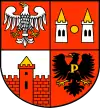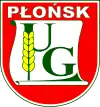Płońsk
Płońsk (Polish: [pwɔj̃sk] (![]() listen); Yiddish: פּלאָנסק, romanized: Plonsk; German: Plöhnen) is a town in north-central Poland with 22,500 inhabitants (2010).[1]
It is situated in the Masovian Voivodeship (since 1999) at the river Płonka; previously, it was in Ciechanów Voivodeship (1975–98). The city is noted for being the birthplace of Israeli Prime Minister David Ben-Gurion.
listen); Yiddish: פּלאָנסק, romanized: Plonsk; German: Plöhnen) is a town in north-central Poland with 22,500 inhabitants (2010).[1]
It is situated in the Masovian Voivodeship (since 1999) at the river Płonka; previously, it was in Ciechanów Voivodeship (1975–98). The city is noted for being the birthplace of Israeli Prime Minister David Ben-Gurion.
Płońsk | |
|---|---|
.jpg.webp) Town center, 2019 | |
 Flag  Coat of arms | |
 Płońsk | |
| Coordinates: 52°38′N 20°23′E | |
| Country | |
| Voivodeship | Masovian |
| County | Płońsk County |
| Gmina | Płońsk (urban gmina) |
| Established | 11th century |
| Town rights | 1400 |
| Government | |
| • Mayor | Andrzej Józef Pietrasik |
| Area | |
| • Total | 11.6 km2 (4.5 sq mi) |
| Population (2010-06-30) | |
| • Total | 22,500 |
| • Density | 1,900/km2 (5,000/sq mi) |
| Time zone | UTC+1 (CET) |
| • Summer (DST) | UTC+2 (CEST) |
| Postal code | 09-100 |
| Area code(s) | +48 023 |
| Car plates | WPN |
| Website | http://www.plonsk.pl |
History
Dating back to 1155, is the first historical record confirming the existence of Płońsk. Around the castle a group of inhabitants was formed, most of whom initially worked on the land. In 1400, Siemowit IV of Mazovia, granted it town rights under Chełmno law, then merchants and craftsmen started to come to town. In the early twentieth century, the population of 10,000 was equally divided between Poles and Jews. It was a centre of the garment industry.[2] The Jews lived mostly within the city, whilst the Poles were more scattered and tended to live in the countryside. Many of the Jewish residents of Płońsk immigrated to Palestine for Zionist reasons, spurred on by the idea of building a Jewish homeland.[3] In September 1940, Jews from the town and the surrounding areas were imprisoned in a ghetto. Soon a typhus epidemic broke out. A hospital, a bathhouse for the sick, a pharmacy, and a folk kitchen were organized in the ghetto.[4] In total, 12,000 Jews were prisoners of the ghetto and from October 1942, they were sent to Auschwitz extermination camp.
Landmarks
The church and the old monastery of Calced Carmelites were founded before 1417 by the prince Siemowit IV of Masovia and his wife Aleksandra, Jogaila's sister.
Sports and culture
The Memoriał Andrzeja Trochanowskiego one-day cycling race is based in Płońsk. The race takes place annually on May 1. It is home to a yearly open theatre festival (held in the summer).
In 2018, local Poles held a celebration in Ben-Gurion's honor for the 70th anniversary of the re-establishment of the State of Israel.[5]
Notable residents
- Henryk Sienkiewicz (1846–1916), novelist and journalist, Nobel Prize laureate
- David Ben-Gurion (1886–1973), the first Prime Minister of Israel
References
- "Population. Size and structure by territorial division. As of June 30, 2010" (PDF). Central Statistical Office. Archived from the original (PDF) on May 15, 2011. Retrieved 2010-12-18.
- Segev, Tom (2018 - 2019 translation Haim Watzman) A State at Any Cost. The Life of David Ben-Gurion. Apollo. ISBN 9-781789-544633 p.48
- Memoirs: David Ben-Gurion (1970), p. 36
- https://sztetl.org.pl/pl/miejscowosci/p/595-plonsk/99-historia-spolecznosci/137855-historia-spolecznosci
- http://www.jpost.com/Diaspora/Hundreds-of-locals-march-through-the-Polish-birthplace-of-Ben-Gurion-549966
External links
| Wikimedia Commons has media related to Płońsk. |
- Interactive map of Płońsk
- Płońsk official website
- Independent forum of Płońsk citizens
- Jewish Community in Płońsk on Virtual Shtetl
- The Story of the Jewish Community of Plonsk - an online exhibition in Yad Vashem website

